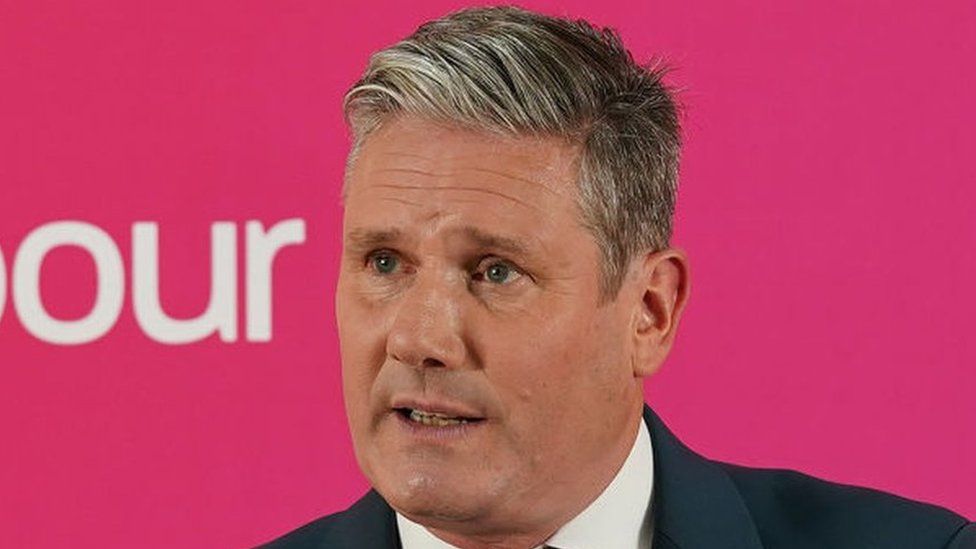ARTICLE AD BOX
By Becky Morton
Business reporter, BBC News
 Image source, Getty Images
Image source, Getty Images
Labour has called for an extension of the tax on oil and gas companies to fund a freeze in the energy price cap.
The cap - the maximum amount suppliers can charge for average use - is forecast to hit £3,582 in October and £4,266 in January.
Leader Sir Keir Starmer said Labour's plans would save the typical family £1,000.
The government said it had pledged £37bn of support to help people through the winter.
Unveiling his party's £29bn plan to help with soaring energy costs, Sir Keir said Labour "wouldn't let people pay a penny more" on their winter fuel bills.
He said freezing the price cap at the current level of £1,971 a year for the typical household would bring inflation down by 4%.
Inflation - the rate at which prices rise - hit 9.4% in June, the highest level for more than 40 years. The Bank of England has warned it could peak at more than 13% in the next year.
The main reason for high inflation is soaring energy bills, driven by Russia's invasion of Ukraine, although households have also been hit by higher petrol, diesel and food costs.
If it was in power, Labour said it would pay for the plans through increased tax revenues from oil and gas producers.
In May, the government announced a one-off windfall tax on oil and gas company profits of 25%, which it expects would raise about £5bn in its first year.
But Labour said it would close an "absurd loophole", by backdating the start date to January and accounting for higher oil and gas prices, which it said would raise £8bn.
The party also said it would use the already-pledged £14bn of non-targeted funding to prevent bills from rising, rather than giving that money back in handouts later on.
It said keeping energy bills down would reduce the rate of inflation, leading to a cut in government debt interest payments of £7bn.
Sir Keir said his party would also reduce energy demand and lower bills in the longer term by insulating 19 million homes over the next decade.
The plans also include a pledge to secure the country's energy supply to protect against future shocks, including by doubling onshore and offshore wind capacity and increasing production of solar, tidal, hydrogen and nuclear power.
Sir Keir said the Conservatives had "failed to prepare and refused to invest", adding that "a national emergency... needs strong leadership and urgent action".
"Labour's fully-funded plan would fix the problems immediately and for the future - helping people get through the winter while providing the foundations for a stronger, more secure economy," he added.
It comes as the independent Institute for Fiscal Studies(IFS) said the government would need to find £12bn simply to achieve what it was aiming to do with the £24bn package announced in May, due to soaring energy prices.
The think tank said that in May energy prices were expected to rise by 95% in 2022/23 but are now expected to rise by 141%.
A Treasury spokeswoman said the government had "continually taken action to help households by phasing in £37bn worth of support throughout the year".
This includes £400 off energy bills for all UK households and an additional £650 for eight million low-income households.
However, officials have made clear no decisions on additional support will be made until the new prime minister takes office.
Conservative leadership candidates Rishi Sunak and Liz Truss have both outlined their own plans for how they would tackle the cost of living crisis if they become prime minister.
Mr Sunak has promised more money to help with energy bills and plans to scrap the 5% VAT rate on household energy.
Meanwhile, Ms Truss has promised several tax cuts, including on National Insurance contributions and green levies on energy bills.
Both are opposed to extending the windfall tax on oil and gas companies, with Ms Truss saying it sends the wrong message to international investors.
The idea of freezing the price cap is backed by the Liberal Democrats and the SNP.
The price cap is the maximum amount suppliers can charge customers in England, Scotland and Wales for each unit of energy.
It does not apply to businesses or in Northern Ireland, but households there have also seen bills rise.

 2 years ago
56
2 years ago
56








 English (US)
English (US)